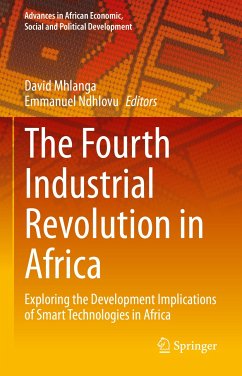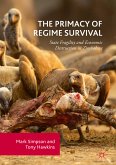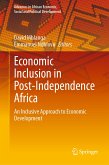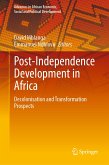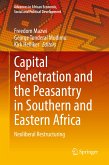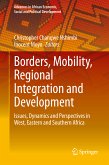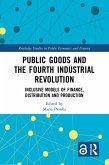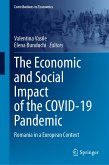The Fourth Industrial Revolution in Africa (eBook, PDF)
Exploring the Development Implications of Smart Technologies in Africa
Redaktion: Mhlanga, David; Ndhlovu, Emmanuel


Alle Infos zum eBook verschenken

The Fourth Industrial Revolution in Africa (eBook, PDF)
Exploring the Development Implications of Smart Technologies in Africa
Redaktion: Mhlanga, David; Ndhlovu, Emmanuel
- Format: PDF
- Merkliste
- Auf die Merkliste
- Bewerten Bewerten
- Teilen
- Produkt teilen
- Produkterinnerung
- Produkterinnerung

Hier können Sie sich einloggen

Bitte loggen Sie sich zunächst in Ihr Kundenkonto ein oder registrieren Sie sich bei bücher.de, um das eBook-Abo tolino select nutzen zu können.
This edited volume, the third in a three-volume set, discusses implications of The Fourth Industrial Revolution (4IR) in Africa. By rebuilding natural ecosystems, linking billions to digital networks, and better managing assets, the world may be able to undo the damage done by the industrial revolutions. There are, however, significant concerns that institutions will not be able to adapt, that governments will not adopt and regulate new technologies to reap their benefits, that power shifts will result in serious new security threats, that inequality will increase, and that societies will…mehr
- Geräte: PC
- ohne Kopierschutz
- eBook Hilfe
- Größe: 12.12MB
![The Primacy of Regime Survival (eBook, PDF) The Primacy of Regime Survival (eBook, PDF)]() Mark SimpsonThe Primacy of Regime Survival (eBook, PDF)30,95 €
Mark SimpsonThe Primacy of Regime Survival (eBook, PDF)30,95 €![Economic Inclusion in Post-Independence Africa (eBook, PDF) Economic Inclusion in Post-Independence Africa (eBook, PDF)]() Economic Inclusion in Post-Independence Africa (eBook, PDF)121,95 €
Economic Inclusion in Post-Independence Africa (eBook, PDF)121,95 €![Post-Independence Development in Africa (eBook, PDF) Post-Independence Development in Africa (eBook, PDF)]() Post-Independence Development in Africa (eBook, PDF)129,95 €
Post-Independence Development in Africa (eBook, PDF)129,95 €![Capital Penetration and the Peasantry in Southern and Eastern Africa (eBook, PDF) Capital Penetration and the Peasantry in Southern and Eastern Africa (eBook, PDF)]() Capital Penetration and the Peasantry in Southern and Eastern Africa (eBook, PDF)113,95 €
Capital Penetration and the Peasantry in Southern and Eastern Africa (eBook, PDF)113,95 €![Borders, Mobility, Regional Integration and Development (eBook, PDF) Borders, Mobility, Regional Integration and Development (eBook, PDF)]() Borders, Mobility, Regional Integration and Development (eBook, PDF)73,95 €
Borders, Mobility, Regional Integration and Development (eBook, PDF)73,95 €![Public Goods and the Fourth Industrial Revolution (eBook, PDF) Public Goods and the Fourth Industrial Revolution (eBook, PDF)]() Public Goods and the Fourth Industrial Revolution (eBook, PDF)44,95 €
Public Goods and the Fourth Industrial Revolution (eBook, PDF)44,95 €![The Economic and Social Impact of the COVID-19 Pandemic (eBook, PDF) The Economic and Social Impact of the COVID-19 Pandemic (eBook, PDF)]() The Economic and Social Impact of the COVID-19 Pandemic (eBook, PDF)113,95 €
The Economic and Social Impact of the COVID-19 Pandemic (eBook, PDF)113,95 €-
-
-
Dieser Download kann aus rechtlichen Gründen nur mit Rechnungsadresse in A, B, BG, CY, CZ, D, DK, EW, E, FIN, F, GR, HR, H, IRL, I, LT, L, LR, M, NL, PL, P, R, S, SLO, SK ausgeliefert werden.
- Produktdetails
- Verlag: Springer International Publishing
- Seitenzahl: 389
- Erscheinungstermin: 11. Juli 2023
- Englisch
- ISBN-13: 9783031286865
- Artikelnr.: 68402581
- Verlag: Springer International Publishing
- Seitenzahl: 389
- Erscheinungstermin: 11. Juli 2023
- Englisch
- ISBN-13: 9783031286865
- Artikelnr.: 68402581
- Herstellerkennzeichnung Die Herstellerinformationen sind derzeit nicht verfügbar.
